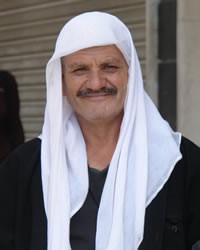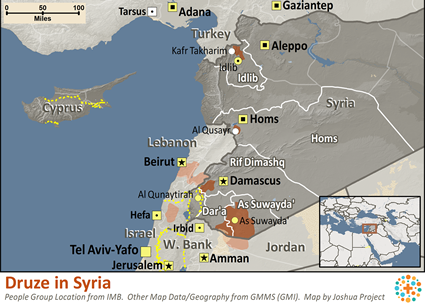Druze refer to themselves as 'Mowahhidoon' (plural) or 'Mowahhid' (singular), which means "monotheistic". They are commonly referred to as "Druze", a name derived from el-Drzi, the name of one of the known propagandists of the Druze religion at its beginning. There are sources suggesting that the Druze were a people of their own even before conversion to the faith of al-Hakim, a Muslim caliph. Unsubstantiated theories say the Druze are descendants of Persian colonists, while another theory says they are of Christian descent, from the time of the crusades. The latter is not very likely, because the first crusade came about 80 years after al-Hakim's disappearance. Druze do not seek their own country, but they are loyal to the country which governs their land. They can be found in Israel, Lebanon, and Syria, and are said to be the best warriors because they are not afraid to die.
Druze are village and mountain dwellers, attached only to their individual plots of land and property, harboring no separatist national aspirations. They follow a lifestyle of isolation. Conversion, both to and from their faith is forbidden. Soon after the religion was founded, they stopped making new converts and have instead perpetuated themselves through their children. Until recently, most girls were married between the ages of 12 and 15, and most men at the age of 16 or 17. When Druze live among people of other religions, they try to blend in, to protect their religion and for safety. They can pray as Muslims or as Christians, depending on where they are living. This system seems to now be changing in response to higher security, allowing Druze to be open about their religious beliefs. Druze have earlier been reported to practice polygamy, but there is no evidence of this practice among Druze today. Druze abstain from wine and tobacco, as there are clear prohibitions against any practice that could involve profanity of their religion. Druze have a strong sense of community, and they consider themselves related, even across country borders. If a Druze man or woman becomes a follower of Jesus Christ, he or she will be excluded from the Druze community.
The religion of the Druze began in the 9th century AD, as a sect of Islam. Darazi, a preacher, and Hamza ibn Ali ibn Ahmad, a Persian mystic, were instrumental in popularizing the religion. They announced that God had manifested himself in human form as al-Hakim Bi-amr Allah (985 or 996-1021 AD), a Muslim caliph from Cairo, Egypt. They now believe that Darazi began to distort the message; his writings are now considered blasphemous.
Druze hold the Koran to be sacred, but look upon it as an outer shell, holding an "inner, esoteric meaning". Their religious texts are known collectively as "Kitab Al Hikma", the book of wisdom. This is a collection of books, of which the first six are most used. They are firmly monotheistic, believing in a single God. They recognize seven major prophets, including Adam, Abraham, and Jesus (who they believe only to be the son of Joseph). Each major prophet had seven minor prophets; each of the latter had twelve disciples.
Druze believe in the transmigration of the soul. That is, at death, one's soul is instantaneously reincarnated (in time and space), and it is reborn into another life. Their concept of heaven and hell is spiritual in nature. It is believed that heaven is the ultimate happiness that the soul encounters when it unites and meets its creator. Hell is the bitter feeling of being deprived endlessly of the glorious presence of the Almighty.
Spiritually the Druze need to meet their Maker in a personal way, opposed to an esoteric mental exercise offered in their religion.
Pray for an abundant blessing of Druze families and communities as they embrace Jesus Christ, the Lord of Lords.
Pray for a movement to Christ that will enrich the Druze community.
Pray for spiritual openness to Jesus Christ that will not be hindered by the false belief in religious institutions rather than the person, Jesus Christ.
Scripture Prayers for the Druze in Syria.
Middle East Resources
| Profile Source: Joshua Project |


























